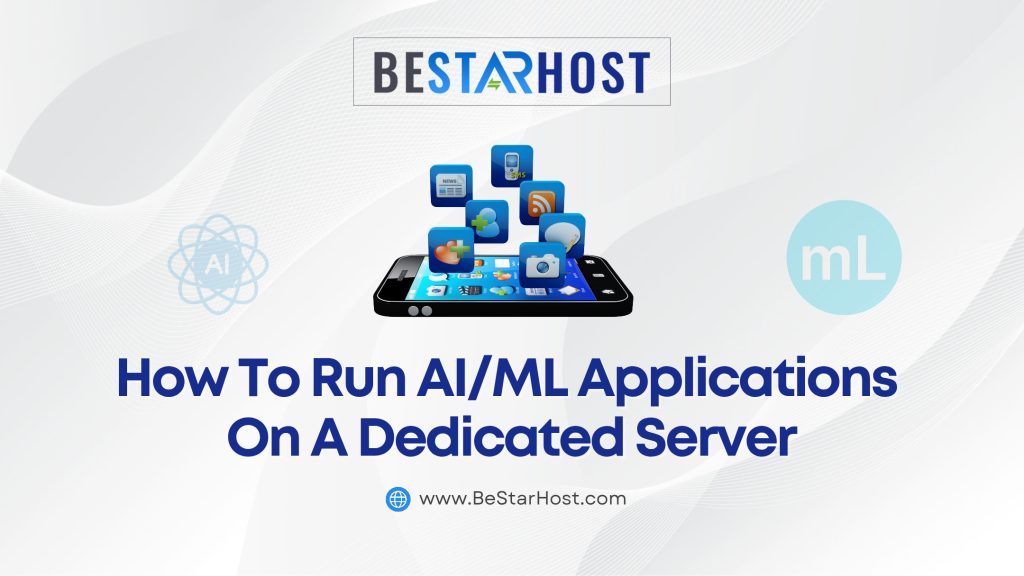 With the rapid growth of artificial intelligence (AI) and machine learning (ML), businesses and developers are constantly searching for reliable and high-performance environments to run their models. While cloud platforms offer scalability, many professionals prefer a Dedicated Server for machine learning due to cost control, privacy, and performance. This guide explains how to host AI applications on a dedicated server, the hardware/software requirements, and how to get started.
With the rapid growth of artificial intelligence (AI) and machine learning (ML), businesses and developers are constantly searching for reliable and high-performance environments to run their models. While cloud platforms offer scalability, many professionals prefer a Dedicated Server for machine learning due to cost control, privacy, and performance. This guide explains how to host AI applications on a dedicated server, the hardware/software requirements, and how to get started.
Why Use a Dedicated Server for Machine Learning?
Unlike shared or VPS hosting, a dedicated server provides complete control over server resources—essential for compute-heavy workloads like training and deploying ML models. Here’s why it’s a popular choice:
-
Full Resource Allocation: CPU, RAM, and storage are exclusively yours.
-
Data Privacy: Ideal for sensitive data, especially in finance or healthcare.
-
Custom Configuration: Install any deep learning framework (e.g., TensorFlow, PyTorch, Scikit-learn).
-
Better Performance with GPUs: You can choose a GPU Dedicated Server for hardware acceleration.
Server Requirements for AI Upload and Model Training
Before deploying your AI solution, make sure your server meets these minimum requirements:
🔧 Basic Hardware Requirements:
| Component | Minimum | Recommended |
|---|---|---|
| CPU | 4 cores | 8+ cores, Intel Xeon/AMD EPYC |
| RAM | 16 GB | 32–128 GB (especially for training large models) |
| Storage | 500 GB SSD | 1–2 TB NVMe SSD |
| GPU (optional) | N/A | NVIDIA A100, RTX 3090, or similar for deep learning |
| Network | 1 Gbps | 10 Gbps for large-scale model hosting or data transfers |
Note: A GPU Dedicated Server is essential if you plan to train models using neural networks or run inference on real-time data.
Software Stack for AI Application Hosting
Whether you’re training models or serving them via an API, your software environment should include:
✅ Operating System
-
Ubuntu 22.04 or CentOS 8 (preferred for stability and community support)
✅ Development Tools
-
Python 3.8+
-
Jupyter Notebook or JupyterLab
-
Docker (for containerized deployments)
-
Git (for version control)
✅ AI/ML Frameworks
-
TensorFlow, PyTorch, Keras
-
Scikit-learn, XGBoost, LightGBM
-
OpenCV (for image-related ML tasks)
✅ Model Hosting Tools
-
FastAPI or Flask for API serving
-
ONNX for cross-platform model compatibility
-
NVIDIA Triton Inference Server (for advanced GPU inference)
Steps to Deploy AI/ML Applications on a Dedicated Server
Here’s a step-by-step overview to help you set up AI application hosting:
1. Choose the Right Dedicated Server Provider
Look for a provider offering GPU Dedicated Server options with flexible configuration. Ensure they offer root access, DDoS protection, and SSD/NVMe storage.
2. Set Up Your Environment
SSH into your server and set up your Python environment using conda or venv. Install ML libraries and dependencies as required.
3. Upload Your Data and Model
Use SCP, SFTP, or Git to upload your training data or pre-trained models to the server. Ensure the file structure is organized for scalability.
4. Train or Fine-tune Your Model
Run your training scripts using screen or tmux to keep processes alive. Use tools like nvidia-smi to monitor GPU utilization.
5. Deploy the AI Model
Use Flask or FastAPI to create an API for real-time predictions. Dockerize your application for easier deployment and scalability.
6. Monitor and Optimize
Use Prometheus, Grafana, or custom logging to monitor server performance, memory, and GPU usage.
Use Cases for Dedicated AI Servers
-
Healthcare AI: Run HIPAA-compliant AI diagnostics locally.
-
Finance: Deploy trading bots or fraud detection models.
-
Retail: Run recommendation engines or demand forecasting.
-
Security: Use image/video-based anomaly detection systems.
Final Thoughts
Running AI/ML applications on a Dedicated Server for machine learning is a powerful option for developers and businesses seeking performance, control, and scalability. With the right configuration—especially with a GPU Dedicated Server—you can streamline both model training and deployment.
As AI adoption grows, so does the need for robust and private infrastructure. Whether you’re deploying a chatbot or an image recognition API, understanding the server requirements for AI upload and deployment is the first step toward success.
Need Help Choosing the Right Server?
Explore our AI-optimized Dedicated Servers with built-in GPU support and high-speed SSD storage to supercharge your machine learning workflows.
